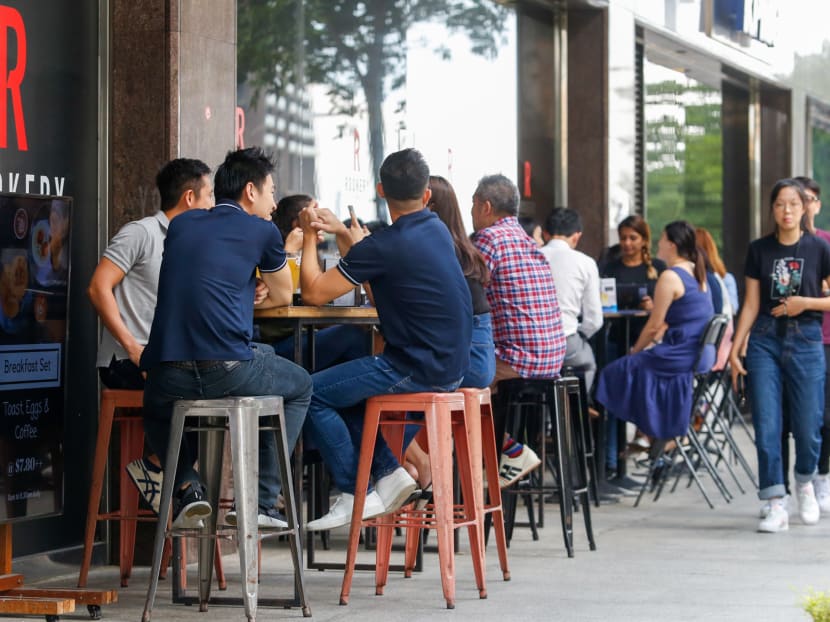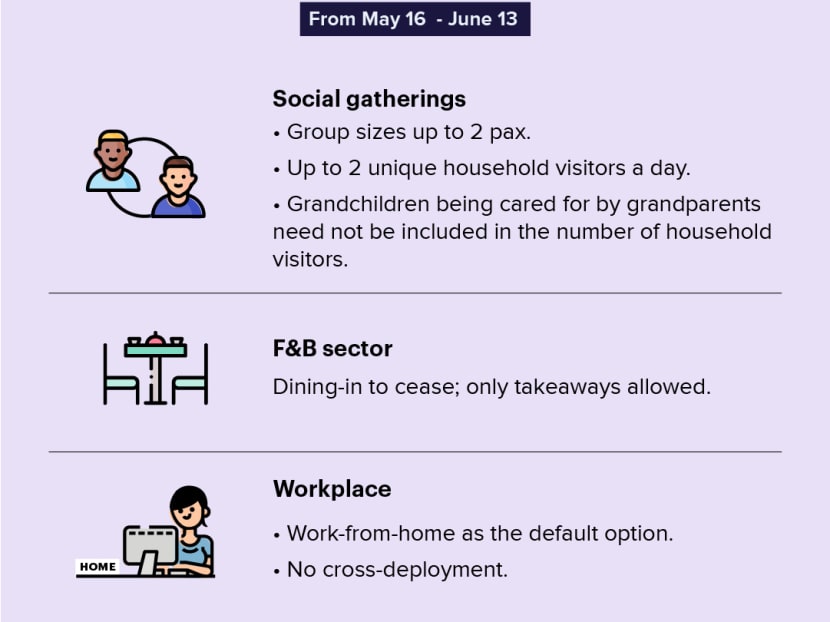Covid-19: Dining-in to be banned, only 2 persons can gather in public amid rising unlinked community cases
SINGAPORE — Given the spike in Covid-19 community cases that have no known sources of infection, group gathering sizes will be reduced to two persons and dining in will be banned from Sunday (May 16) to June 13 as Singapore’s authorities scramble to contain the spread of coronavirus.

Eateries are higher-risk settings because customers who do not wear masks often linger for prolonged periods near one another, the Ministry of Health said.
- From May 16 to June 13, people can gather only in groups of up to two
- Dining-in at F&B places, both indoor and outdoor, will be banned
- Homeworking will remain the default
- These measures are in response to the “persisting” pattern of community cases with no known links
SINGAPORE — Given the spike in Covid-19 community cases that have no known sources of infection, group gathering sizes will be reduced to two persons and dining in will be banned from Sunday (May 16) to June 13 as Singapore’s authorities scramble to contain the spread of coronavirus.
The Government’s Covid-19 task force announced on Friday that people will be allowed to gather in groups of up to two — down from the current five. The daily cap of five distinct visitors for each household will also be cut to two distinct visitors a day.
To allow families’ childcare arrangements to continue, grandchildren being cared for by their grandparents will not count towards the visitor limit or the number of daily social gatherings.
However, the Ministry of Health (MOH) said: “Individuals should continue to limit their overall number of social gatherings to not more than two per day, whether to another household or meeting with friends and family members in a public place.”
At food-and-beverage (F&B) establishments, no one will be allowed to dine in, including at hawker centres and coffee shops.
These are higher-risk settings because customers who do not wear masks often linger for prolonged periods near one another, MOH said.
To curb community transmission, dine-in eateries, both indoor and outdoor, may offer only takeaways and deliveries.
MOH added that the recent coronavirus clusters have shown “higher attack rates” and that secondary transmission happens in households, eateries and settings where people do not wear masks.
In a clarification statement issued later in the day, the ministry said that there may be occasions where members of the same household may need to move about in groups larger than two persons, especially those with young children or older parents.
Caregivers who will need to attend to their needs when taking public transport, going for medical appointments, attending classes or going to work in the same vehicle, for instance, may be allowed.
"We are prepared to be flexible in our implementation of the general rule for such bonafide cases," MOH said.
Other than that, it said that members of the public from different households making use of public amenities such as playgrounds, fitness corners, basketball courts and so on should keep to groups of two people and maintain proper safe distancing.
"Strict enforcement measures will be taken against any breaches of the safe management measures. We also do not rule out having to close such amenities if there are persistent breaches of the measures."
Other activities that will not be allowed during this period include strenuous indoor exercise classes or vigorous individual and group indoor sports and exercise activities.
The following activities that require masks to be removed will also be banned:
-
Facials and saunas
-
Singing
-
The playing of instruments requiring intentional expulsion of air, such as wind or brass instruments
Medical and dental services will continue.
.embed-container { position: relative; padding-bottom: 56.25%; height: 0; overflow: hidden; max-width: 100%; } .embed-container iframe, .embed-container object, .embed-container embed { position: absolute; top: 0; left: 0; width: 100%; height: 100%; }WORK-FROM-HOME REMAINS DEFAULT
At workplaces, people must work from home as the default arrangement.
Employers must ensure that employees who can work from home do so.
MOH said: “There should continue to be no cross-deployment of workers to multiple worksites. Employers should continue to stagger start times of employees who need to return to the workplace and implement flexible working hours.”
Social gatherings at workplaces will also be banned.
Employees may have meal breaks at their workplaces, but they should refrain from mingling with their colleagues when they remove their masks.
MOH said that these measures would lower transmission risks by reducing footfall and interactions at common spaces at or near workplaces and in public places, including on public transport.
The ministry said that the latest measures to curb community transmission were in response to the “persisting” pattern of community cases with no known links to confirmed cases.
The number of cases in the community with unknown origins has risen to 15 this past week from seven cases in the week before, MOH said in an update on the coronavirus situation on Thursday night.
On Friday, the ministry said that this was “worrying as it suggests that there may be unknown cases in the community with possible ongoing community transmission and that our earlier measures to break the chains of transmissions may be insufficient”.
“We need to act decisively to contain these risks as any one leak could result in an uncontrolled resurgence of cases.”
Education Minister Lawrence Wong, co-chair of the task force, said that the Government would review the measures two weeks from Sunday and “will not rule out” tightening them. But if things improve, the authorities “may also consider (going) the other way”.
Weighing in on the more stringent rules, Prime Minister Lee Hsien Loong urged people to stay home as far as possible, go out only for essential tasks and follow government advisories.
He said in a Facebook post that the new coronavirus clusters and community cases with unknown links in the past fortnight were very worrying.
The Government, he said, is testing more intensively and doing its utmost to ring-fence the transmissions.
“But we also need stricter restrictions to stop more cases from popping up.”
Mr Lee added: “If you do go out, remember to practise safe-distancing measures, like using TraceTogether (the contact-tracing mobile application) and wearing a mask.”
He also urged people to get vaccinated once the jabs are offered to them.
“The new measures will be difficult for everybody. But, if we all play our part and look out for one another, we will succeed in stemming the transmission of the virus, just like we did last year,” he said.

SUPPORTING F&B FIRMS, HAWKERS
With dining-in banned at F&B places, the Government will increase support under the Jobs Support Scheme — which helps firms retain workers — to 50 per cent of the first S$4,600 of gross monthly wages paid to Singapore employees between Sunday and June 13.
This is up from 10 per cent for wages paid until June.
To support hawkers and stallholders at coffee shops, who are self-employed and do not benefit from the Jobs Support Scheme, the Government will offer one month of rental waivers for hawker stall and coffee shop tenants of government agencies.
The Government also urged commercial landlords to help their F&B tenants tide over this period.









